#march international for Haiti
Text
#haiti legends#Nou sou kont Anwo#praise and worship#praise the lord#souf pou ayiti#gregory Toussaint#mach mondyal pou ayiti#delly benson#mwen sou kont anwo#march international for Haiti#iamgabrisan#Haitian music
6 notes
·
View notes
Text
I hate that European people, especially young seem hyperfocused on the Israel conflict when we are in immediate danger here in Europe like idk there must be some kind of dissonance or white saviour or other reason bc how are you not afraid? Angry? Worried?
#maybe it's people born after 9/11 but sometimes they're a lot older completely ignoring internal issues or forgetting about ukraine and#going marches and riots for the other conflict also being oblivious of any other conflict happening worldwide#like yemen was there before the houti? Haiti? sudan? hong kong?#personally I'm worried. now i understand americans they live isolated from everything if nato goes to war they won't be directly involved#but their soldiers will. I'm not saying stop caring about 1 conflict or be aware of everything!!!#but especially if u live in europe seeing so much careless and indifference for what happens at russian borders is ...idk
0 notes
Text
Haiti’s deepening crisis — armed groups launching an assault on the government, and the de facto prime minister on indefinite layover in the San Juan, Puerto Rico airport — is a predictable consequence of 14 years of U.S. support for undemocratic regimes connected to Haiti’s PHTK party as it has dismantled Haiti’s democracy.
Haiti has a chance at reversing this descent and returning to a more stable, democratic path, but only if the Biden administration will let it.
Prime Minister Ariel Henry was stranded in San Juan Tuesday on his way back from Kenya, where he had signed an agreement for Kenyan police to come bolster his repressive, corrupt and unpopular regime. The armed groups, including many that had collaborated with Henry’s regime, took advantage of his absence to attack government infrastructure, and free 5,000 prisoners, many of them members of armed groups. Henry had planned to fly to the neighboring Dominican Republic and take a helicopter ride back to Haiti’s National Palace under the cover of darkness. But Dominican authorities refused entry to the prime minister’s chartered plane, which re-routed to San Juan.
Prime Minister Henry has not yet resigned, and the State Department denied reports that it demanded his resignation. But Henry has clearly lost the support of the United States, which for two years had allowed him to resist Haitians demands for fair elections. Absent Washington’s support, Henry has little chance of regaining power.
This dire situation is not only predictable, it was predicted. Haitian-American officials, Haitian civil society, members of the U.S. Congress, and other experts had been warning for years that the U.S. propping up Henry would lead to increasing tragedy for Haitians. The United States, which installed Henry in power in the first place, ignored these pleas and stood resolutely by its friend. With U.S. support, Henry’s unconstitutional term as prime minister exceeded any other prime minister’s term under Haiti’s 1987 Constitution. Levels of gang violence, kidnapping, hunger, and misery also reached unprecedented levels.
The United States is still insisting on getting Kenyan troops to Haiti. The State Department has persistently — if so far unsuccessfully — tried to deploy non-American boots onto Haitian ground since Henry requested them in October 2022. The mission’s deployment initially stalled because it was widely rejected as a bad idea that will primarily serve to prop up the repressive regime that generated the crisis. Haitian civil society [groups] repeatedly insisted that the first step towards security must be a transitional government with the legitimacy to organize elections and determine how the international community can best help Haiti.
Concerns that the intervention would serve only to reinforce an unpopular regime led the countries that the Biden administration first tapped to lead the mission, including Canada, Haiti’s Caribbean neighbors, and Brazil, to pass. The U.N. itself concluded that the mission would require too much “robust use of force” to be appropriate for a peacekeeping mission. So, the Security Council took the unusual step of authorizing the mission, but on the condition that it not actually be a U.N. mission that the organization would have to take responsibility for. The Biden administration, likely concerned about election-year cell phone videos of troops shooting indiscriminately in crowded neighborhoods — as the last foreign intervention did — declined to send U.S. troops for the mission (but is considering deploying a small Marine contingent to Haiti in early March).
Last August Kenya — which did not even have diplomatic relations with Haiti but did need the hundreds of millions of dollars that the United States offered — agreed to lead the mission. The exploratory delegation Kenya sent to evaluate conditions in Haiti quickly realized how deadly the planned mission would be for Haitians and Kenyans alike, and proposed to limit its scope to protecting public infrastructure.
The United States was not open to renegotiating the deal, and Kenya withdrew its proposed limits. But Kenya’s High Court temporarily blocked the deployment as unconstitutional. Ariel Henry’s visit to Kenya was for the signature of an accord that Kenya’s President William Ruto hoped would overcome the court’s objections. Kenyan lawyers insist that the agreement itself is illegal, and are continuing their challenge. In the meantime, Kenyan officers who had volunteered for the mission are changing their minds. Another obstacle appeared on March 7, when the White House conceded that the mission cannot be deployed without congressional approval of funding.
The State Department’s insistence that the Kenyan deployment must nevertheless happen raises fears that the United States will also continue its policy of installing and propping up undemocratic regimes in Haiti. Finance Minister Patrick Boisvert, who Henry tapped as interim prime minister when he left for Kenya, increased concerns of authoritarian governance on March 6 when he declared a three-day curfew and state of emergency throughout the Port-au-Prince region in an edict that did not even mention the legal basis for his authority. The next day Boisvert raised more fears by extending the emergency measures for a month and adding in a ban on all protests.
The State Department’s rescinding its support for Henry might have been promising had the gangs not already made his ouster inevitable. State’s claim that it now supports “an empowered and inclusive governance structure” that will “pave the way for free and fair elections” might have been promising if it had not added the condition that the new government must “move with urgency to help the country prepare for a multinational security support mission.”
A legitimate, broadly supported, sovereign transitional Haitian government might request foreign police assistance. But a government allowed to form only if it accepts a U.S.-imposed occupation force originally designed to prop up a hated, repressive government is not sovereign. It may not be legitimate or broadly-supported either.
The United States tasked CARICOM, the federation of Haiti’s Caribbean neighbors, to forge a civil society consensus. CARICOM has enjoyed credibility in Haiti in the past, but over the past few months it has faced criticism for trying to strong-arm civil society into an agreement that maintained Henry’s power. Not surprisingly, CARICOM-led talks on March 6 and 7 failed.
When allowed, Haitians have a history of coming together to make their way out of a crisis. Haiti became a country in 1804 by defeating Napoleon, with almost no outside help. In 1986, when the U.S. finally withdrew its support from Jean-Claude “Baby Doc” Duvalier, Haitians eventually wrested power from the military and held fair elections. In 2006, they voted their way out of the crisis created by the U.S. kidnapping of President Jean-Bertrand Aristide two years before. In August 2021, shortly after the killing of Haiti’s last president, Jovenel Moïse, a broad-based group presented the Montana Accord that would have created a transitional government leading to elections in two years. The U.S. vetoed the accord, citing, among other reasons, that the two-year time frame was too long. That was 30 months ago, and there are no elections in sight.No amount of submission to U.S. demands by Prime Minister Henry and his predecessors can justify the absolute horror that our support has allowed them to inflict on the Haitian people. It is time for the United States to let Haitians come together and make their way out of the current crisis. Civil society [groups] [see] an opportunity for democracy in the crisis, and people all over Haiti have been meeting, discussing and negotiating to develop platforms for a broad-based, legitimate transitional government that can hold fair elections. It is expected that soon — maybe within weeks — one of these platforms will rise to the top, and civil society will coalesce around it. The United States needs to let that process happen without interference or conditions.
8 Mar 24
312 notes
·
View notes
Text


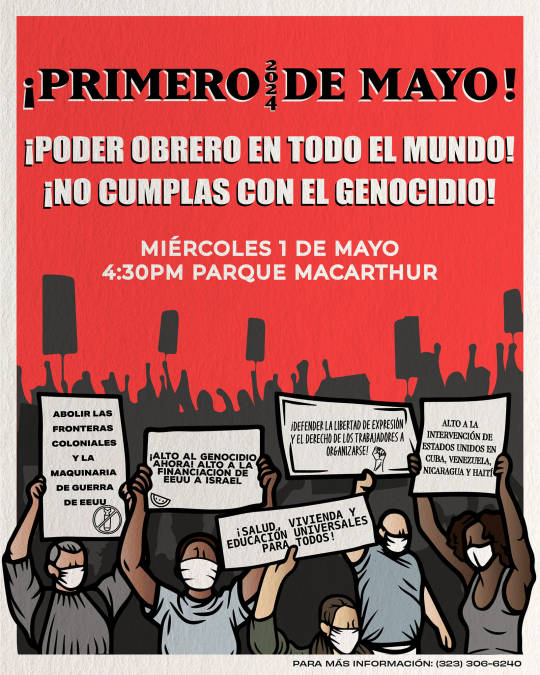
Los Angeles: May Day march
Wednesday, May 1 - 4:30 p.m.
Gather at MacArthur Park, Los Angeles
We invite everyone to participate in this year's May 1st March on International Worker's Day! Dozens of organizations are joining together to organize this march to defend worker's rights and to demand an end to the Israeli genocide and occupation in Palestine!
The march will begin at MacArthur Park and will end at the Downtown LA Federal Building.
These are the march Demands!
FREE PALESTINE NOW!
End the Occupation!
Stop ALL US $$$ to Israel
Defend Free Speech & Worker’s Rights to Organize!
Universal Healthcare, Education, Housing for ALL!
Stop LAPD & ICE Terror!
Stop Deportations! Full Legalization NOW!
Abolish Colonial Borders & the US War Machine!
Stop US Intervention in Cuba, Venezuela, Nicaragua, Haiti
≈==≈========
¡Invitamos a tod@s a participar en la marcha del 1 de mayo de este año en el Día Internacional del Trabajador! ¡Docenas de organizaciones se están uniendo para organizar esta marcha para defender los derechos de los trabajadores y exigir el fin del genocidio y la ocupación israelí en Palestina!
La marcha comenzará en MacArthur Park y terminará en el Edificio Federal del Centro de Los Ángeles.
¡Estas son las Demandas de la marcha!
¡Libertas para PALESTINA!
¡Alto a la ocupación!
No mas $$$ a Israel!
¡Defender la libertad de expresión y los derechos de los trabajadores a organizarse!
¡Atención sanitaria universal, educación y vivienda para TODOS!
¡Alto al terrorismo de la Policia (LAPD) y de la migra (ICE)!
¡Alto a las deportaciones! Legalización Total YA!
¡Abolir las fronteras coloniales y la maquinaria de guerra estadounidense!
Alto a la intervención de Estados Unidos en Cuba, Venezuela, Nicaragua y Haití
#May Day#Los Angeles#protest#solidarity#FreePalestine#immigrants#workers#class struggle#communist#socialism#revolution#Struggle La Lucha#union del barrio
36 notes
·
View notes
Text
On March 5, Haiti’s acting prime minister took off on a chartered Gulfstream jet from a New Jersey airport with nowhere to go.
Ariel Henry—Haiti’s unelected leader since July 2021—had spent weeks traveling in Africa and the Americas trying to rally international support for his country, which has been mired in chronic poverty, political instability, and an insurgency of criminal groups led by a former Haitian police officer turned gang leader, Jimmy Chérizier, known as “Barbecue.”
While Henry was out of the country, Barbecue and his allies coordinated an armed assault calling for Henry’s ouster. They stormed police stations and prisons, released around 3,700 inmates, and attacked the airport in the capital, Port-au-Prince, making it too dangerous for Henry to land there.
Instead, Henry tried to negotiate a plan to land in neighboring Dominican Republic, but he was rebuffed at the last minute by the government there, according to U.S. officials, Caribbean officials, and regional experts familiar with the matter. Other Caribbean countries reacted coolly to the prospect of hosting Henry as his support domestically and abroad began collapsing. Finally, he landed in the U.S. territory of Puerto Rico, where he remained in limbo until March 12, when he announced his intention to resign.
The chaos and uncertainty of Henry’s final flight as prime minister underlined the political tumult that has gripped Haiti—and the tepid response to Haiti’s downward spiral by an overstretched international community reluctant to tackle yet another crisis.
If Haiti isn’t yet formally deemed a failed state, it’s well on its way. Government institutions and basic services have broken down and gang violence has sparked one of the worst humanitarian and refugee crises in the Western Hemisphere.
“It’s an extremely dangerous situation,” said Bocchit Edmond, Haiti’s former foreign minister who now runs the Haitian Observatory of International Relations think tank. “Without a change, we are facing a possibility of an entire nation becoming a big open-air jail run by gangs.”
Yet what that change should look like—and who might be willing and able to step in to make it happen—remains as unclear now as it has for more than two years.
Haiti’s near collapse has led to frantic meetings among regional leaders in recent weeks and heated debates between the Biden administration and Congress over what role, if any, the United States should play in the unfolding emergency in its own backyard. U.S. Secretary of State Antony Blinken traveled to Jamaica on Monday to meet with Caribbean leaders on the issue, and he pledged an additional $100 million in U.S. funds to finance the deployment of a multinational force to help stabilize the country.
The Biden administration is urging Congress to unlock even more funds. Two powerful Republican lawmakers—Sen. Jim Risch, the top Republican on the Senate Foreign Relations Committee, and Rep. Michael McCaul, chairman of the House Foreign Affairs Committee—argue that the administration doesn’t have adequate plans for how it would use those funds. They also charge that the administration let its Haiti policy fester in indecision for too long, exacerbating the country’s current predicament.
Haiti, the poorest country in the Western Hemisphere, has faced chronic instability for decades, fueled in part by devastating natural disasters and international aid mishaps, including a U.N. mission that brought a deadly cholera outbreak to the country as well as sexual exploitation and abuse of women and children by U.N. peacekeepers, and a 2010 earthquake that killed an estimated 300,000, followed by bungled international relief efforts that sparked a cycle of mismanagement and stunted development projects.
In 2021, then-President Jovenel Moïse was assassinated by a group of gunmen in his home, sparking the current political crisis in the country. (A Haitian judge last month indicted three prominent individuals—Moïse’s widow, an ex-prime minister, and a former Haitian chief of police—for involvement in the assassination, charges they have denied as baseless political reprisals.) Henry took over as acting president shortly after and soon began pleading with foreign powers for a military intervention to address the country’s spiraling instability.
Gangs have taken control of much of Port-au-Prince, and rights groups say the gangs have used rape and torture as weapons against the civilian population. Thousands of Haitians have been killed and kidnapped.
“It is difficult to overstate the gravity of the political, security, human rights and humanitarian situation in Haiti today,” the U.N. mission in Haiti wrote in a report to the U.N. Security Council in January, a copy of which was obtained by Foreign Policy. The violence has led to a surge in Haitians fleeing the country; the report noted that the number of Haitians fleeing to Central America with the aim of making it across the U.S. southern border increased 23-fold in 2023—from 1,550 people in July to 35,500 people in October.
The U.S. Embassy in Haiti this week evacuated some diplomats and nonessential personnel as well as deployed a specialized detachment of U.S. Marines to bolster the embassy’s security. Gen. Laura Richardson, commander of U.S. Southern Command, told lawmakers in a hearing on Thursday that the U.S. military had plans ready to evacuate U.S. citizens if the crisis worsened.
“It’s absolute chaos. People are crying out for even some basic level of security,” said Nicole Widdersheim, deputy Washington director at Human Rights Watch. “We need to see the international community doing something very rapid to bring security and stability and protection from the violence.”
The international community, meanwhile, procrastinated on the matter for over two years, officials and experts said.
After Moïse’s assassination, the United States balked at the prospect of leading a multinational force. In 2023, U.S. President Joe Biden privately asked Canadian Prime Minister Justin Trudeau if Canada would take the lead, current and former officials said. Canada declined, but it offered to contribute $100 million to help fund such a force. No other country in South or Central America stepped up. Haiti, coordinating with the Biden administration, then turned to Africa. Kenya agreed to lead a mission and deploy 1,000 police officers to Haiti as part of an effort that would be coordinated and bankrolled mostly by the United States.
That plan stalled when Kenyan opposition politicians challenged the program’s legality. The U.S. government, meanwhile, already overstretched by the wars in Ukraine and Gaza, let Haiti fall by the wayside, current and former U.S. officials told Foreign Policy. Biden didn’t nominate a U.S. ambassador to Haiti until May 2023, nearly two years after Moïse’s assassination. Biden’s nominee, career diplomat Dennis Hankins, was confirmed to the post by the U.S. Senate on Thursday.
“A lot of countries at the beginning were reluctant to take the lead, though Haiti needs urgent help,” Edmond said. But, he added, “At the end of the day, we also need to take our own responsibilities for our own country. I don’t think I will throw the blame only on the international community.”
Henry’s resignation announcement was quietly seen as a relief by some U.S. and regional officials, but it also created new challenges as the region tries to cobble together a temporary governance structure from afar to lead Haiti out of its crisis.
His announcement came after quiet pressure from the Caribbean Community (CARICOM), officials said, as well as repeated threats from gang leaders should he return to the country. (The White House has denied reports that it also pressured Henry to resign.)
Now, CARICOM is helping craft a new presidential transitional council composed of seven voting members and two observers, according to a copy of the agreement obtained by Foreign Policy. Candidates for the council would be put forward by at least five active Haitian political parties with input from CARICOM-screened civil society organizations. Once appointed, the new council, in theory, would help restore legitimacy to Haiti’s absent government and lead the country on a path toward stability and, eventually, elections. Henry has said he’ll officially step down once the new council is in place.
Almost immediately, though, current and former officials said, those efforts hit a wall as Haitian elites began wrangling with CARICOM officials over who should make the final cut, and some potential member candidates voiced fear for their families’ lives if they joined the council. On Friday, Blinken said that most of the parties have named their representatives for the council but that several still have not.
Edmond said many Haitians are skeptical of the plan and “don’t believe it’s the right solution.” Edmond said he believes a better alternative would be for the Haitian Supreme Court to take temporary control and appoint a technocrat as prime minister to strengthen Haiti’s national police forces and lead the country into elections.
Meanwhile, Henry’s resignation has put on hold the U.S.- and U.N.-backed plan for Kenya to deploy a police force to Haiti to help restore order to the country. Kenyan President William Ruto said he remained committed to the plan but that it would only occur after the transitional council was established. It’s unclear whether Henry’s resignation will create new legal hurdles for Ruto to carry out the deployment.
Biden administration officials also considered offers from Senegal and Rwanda to lead the security assistance force, but those proposals were ultimately rejected in favor of Kenya, current and former U.S. and Haitian officials said. Rwanda faces widespread criticisms over its checkered record on human rights and authoritarian bent, and Senegal is currently mired in its own political crisis over delayed elections. However, Kenya’s police have also been accused of committing abuses at home by human rights groups, including the use of excessive force and the killing of more than 100 people in 2023.
The planned Kenyan operation, even if it is able to commence, faces significant practical and logistical challenges, U.S. officials and congressional aides said. For starters, neither Kenya, the United States, nor other regional powers have stated what the rules of engagement would be for Kenyan forces once they are deployed to the country, where they face the daunting task of quelling powerful and heavily armed gangs and a weakened and embattled local police force.
There is also the broader question of whether adding more police will solve the deeper systemic issues that led to the current situation. “The police cannot make significant inroads against gangs absent a broader political breakthrough,” Pierre Espérance, the executive director of the National Human Rights Defense Network in Haiti, argued in Foreign Policy last July. “In Haiti, gang members are not independent warlords operating apart from the state. They are part of the way the state functions—and how political leaders assert power.”
An unclassified U.S. intelligence assessment released this week predicted that Haitian gangs “will be more likely to violently resist a foreign national force deployment to Haiti because they perceive it to be a shared threat to their control and operations” and that Haiti’s national police have been “unable to counter gang violence and [have] been plagued by resource issues, corruption challenges, and limited training.”
Any deployment of Kenyan forces would also require substantial logistical support from the U.S. military, U.S. officials and congressional aides familiar with the matter said. Administration officials have told Congress that once given the green light, Kenyan police could be deployed to Haiti in a matter of 45 to 60 days in ideal conditions—and without U.S. boots on the ground. But Haiti has no clear base or logistics hub for the Kenyan police to be deployed to, particularly after gangs seized control of major power centers in Port-au-Prince.
Another complicating factor is the funding mechanism. After balking for nearly two years on proposals to deploy their own forces to Haiti, the U.S. and Canadian governments have both pledged to fund the Kenyan-led force, but no funding mechanism has been set up yet to do that. A multinational police mission in Haiti could cost an estimated $500 million to $800 million per year, State Department officials have told congressional oversight committees.
Risch has held up an estimated $40 million of the first tranche of U.S. funding for the Kenya-led mission. “[A]fter years of discussions, repeated requests for information, and providing partial funding to help them plan, the administration only this afternoon sent us a rough plan to address this crisis,” Risch said in a joint statement with McCaul. The administration “owes Congress a lot more details in a more timely manner before it gets more funding,” they said.
John Kirby, White House National Security Council spokesperson, said the situation is getting worse in the meantime. “The violence has been increasing, not decreasing, as well as the instability. And, of course, the Haitian people are the ones that are suffering as a result,” he told reporters on Thursday.
Edmond said that even if the Kenya-led mission gets underway, the United States has a “moral obligation to consider, before the arrival of the Kenyan forces, a way to help the national police forces that are now being overwhelmed by the gangs.”
“The United States is the leader of the free world. Haiti is a member of that world, one of the closest neighbors to the U.S. There is a moral obligation here to step in.”
Widdersheim said the United States can’t dodge responsibilities. “Half measures won’t be good enough this time,” she said. “The U.S. government hasn’t in the past seemed to care enough to truly invest in Haiti’s long-term development, and it’s to our detriment because nothing ever sticks; we just get stuck doing half measures that always fail.”
27 notes
·
View notes
Text
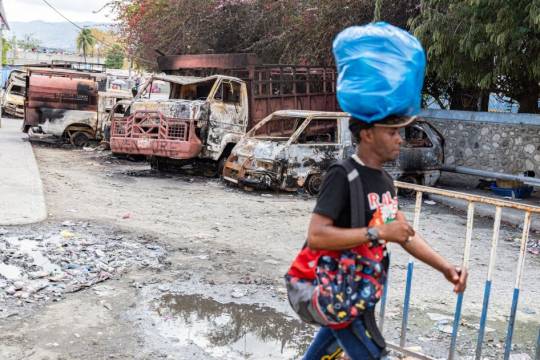
Haiti is on the brink of a total collapse or takeover of the state as violent criminal groups seeking to overthrow the government have attacked police officers and state institutions, including prisons, Human Rights Watch said today. The groups’ actions have brought economic activity, the delivery of life-saving humanitarian assistance, and nearly all transportation, including the country’s main port and international airport, to a near standstill.
“With Haiti on the cusp of even greater chaos and violence, it is more urgent than ever for regional and international partners to support Haitians’ calls for a rights-based international response that addresses all aspects of the crisis,” said Nathalye Cotrino, crisis and conflict researcher at Human Rights Watch. “This should include an international support mission that complies fully with human rights and the formation of a transitional government that can work with partners to restore basic security, democratic governance, access to necessities, and the rule of law.”
In October 2023, the United Nations Security Council authorized a Multinational Security Support mission to provide operational support and training for the Haitian National Police, though it has yet to deploy to Haiti.
Criminal groups, which control much of the country, including nearly all of the capital, Port-au-Prince, have killed over 1,100 people and injured nearly 700 others just since the start of 2024, according to the UN. Nearly 13,000 people were killed, injured, and kidnapped by criminal groups between January 2022 and early March 2024. Thousands of women and children have been victims of sexual violence and over 362,000 people have been internally displaced. The rates of food insecurity in Haiti are among the worst in the world. Many children are out of school, and child use and recruitment by criminal groups are on the rise. [Human Rights Watch]
38 notes
·
View notes
Text

Spring is here and that means new growth, new knowledge, and new histories to recover 🌸
Please join us this Sunday as we will hold space with afrofeminist historian Dr. Nneka Dennie to reflect and reimagine the International Day of Remembrance for the Victims of Slavery and the Transatlantic Slave Trade. As we continue to watch and witness the resurgence of apartheid and white supremacy rippling across our world, upRooting our miseducation about our shared (and very segregated) history is essential to manifesting everyday resistance and reclamation in our community gardens, hearths, and (neighbor)hoods. Save your seat here~
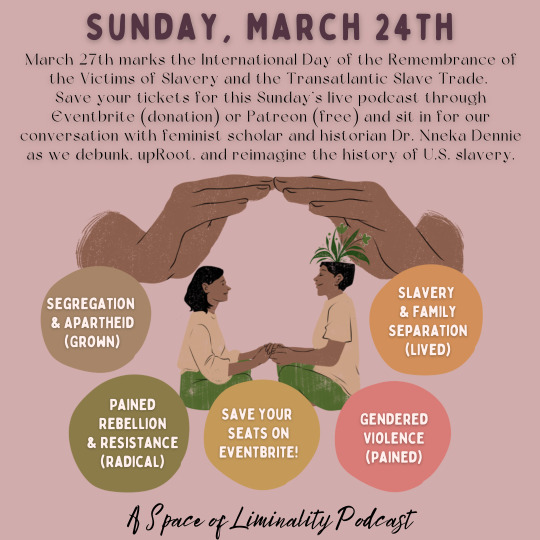
📆 Sunday, March 24th at 12:00 PM (EST)
🎟️ To support the labor and liberation work of our speakers, this program is ticketed. (Patrons of the Antiracist Liberation can access the program and playback via Patreon | www.patreon.com/antiracistliberation)
⚠️ This program contains topics involving antiblack racism, family separation, cultural erasure, gendered violence, and a whole lot of white supremacy.
🍉 As we continue recovering our history, we also continue our solidarity and freedom struggle efforts to call for the end the apartheids and imperial projects in Palestine, Congo, Yemen, Sudan, Ethiopia, Ukraine, Hawai’i, Haiti, and across our indigenous, diaspora, queer, (dis)abled, and (dis)placed communities. None of us are free until we are ALL free to exist as our full selves free of colonialism.
9 notes
·
View notes
Text
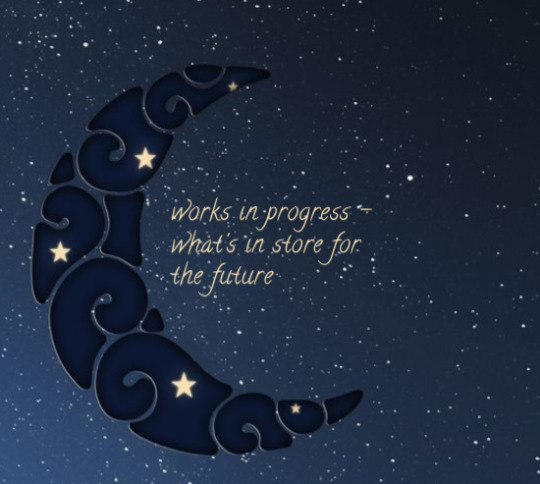
ALL TO BE EXPECTED IN THE FIRST HALF OF 2024!!
Last updated - 11th March 2024
OKOYE
Internal Scars
Summary: Prompted from the deleted scene between Okoye and Shuri in Wakanda Forever. Leaving Shuri in Haiti for the time being, Okoye decides that her departure from the Dora Milaje will not be in vain. It's time to rediscover herself. Her full self, including the good, the bad, and the messy. The messiest bit of it all? Her arriving at your house, after years of not speaking.
I'll be waiting
Summary: When Okoye was assigned to do her first round of training internationally, she had low expectations. Learning how the outside world works? Sure. Protecting the king at all costs? Of course. Falling in love with a girl she might never see again after the summer? She'd say that was one of the lesser expected events. But it's happened, fast and hard, She's in love. And that seems to be the one thing she's 8unsure of how to handle.
RAMONDA
Loving you unequivocally
Summary: Before you, Ramonda wasn't sure what she was looking to find. But now that she's found it, she's not sure what she's doing, falling in love like a schoolchild, unable to control the urges she has to give you the world, even when you never asked for it.
Upcoming Drabbles/Headcannons...
NAKIA
Hurt People
Summary: When Nakia chose T'Challa over you, you accepted it with a heavy heart. But when she disappeared without a word, leaving you to imagine only the worst happening to her, that hurt more than anything. Now, she's back. And any trace of progress that you might have had over the years is completely wiped away.
13 notes
·
View notes
Text
Lynn Garrison
March 10, 2024
I have been involved in an ongoing effort to guide Haiti out of the chaotic train wreck that has followed the loss of my good friend, Jovenel Moise. Our team started meeting during 2022 and became finely focused when Prime Minister Henry created the HCT – Haut Conseil de Transition, headed by Mirlande Manigat. The three member group, was projected as the element that would see a new situation created, through which the Nation could move forward towards some sort of regeneration.
A new cabinet… elections … perhaps a rewrite of the Constitution.
HOPE…. !
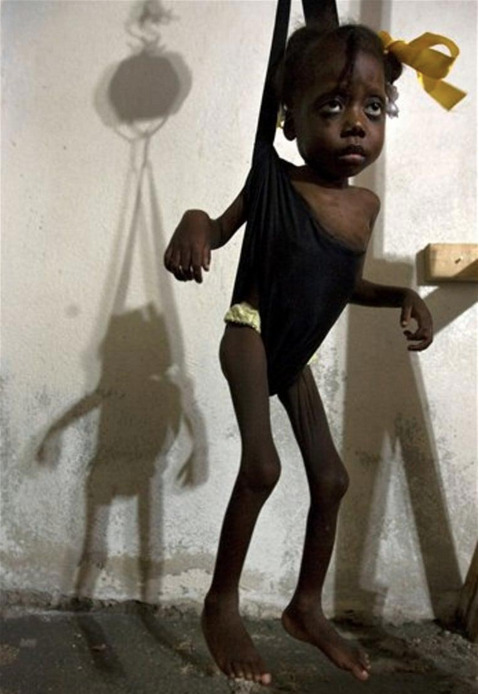
I can never recall who the other two members were/are but they really didn’t matter. It was Madame Manigat’s presence that offered a vehicle for survival. And so, we started to pressure the Prime Minister in the hope that he and Madame Manigat would create a new cabinet and set a date for elections.
From time-to-time there seemed some hope, but PM Henry never took the necessary step to get out of our Nation-Threatening situation. There was always delay. He allowed us to continue the slide towards the Abyss. Some members of his team got funds from Finance Minister Boisvert and passed the cash along to gangs in a criminal effort to maintain instability, an instability the benefitted their personal position.
(Today Finance Minister Boisvert wants to become PM so he can perfect his criminality)
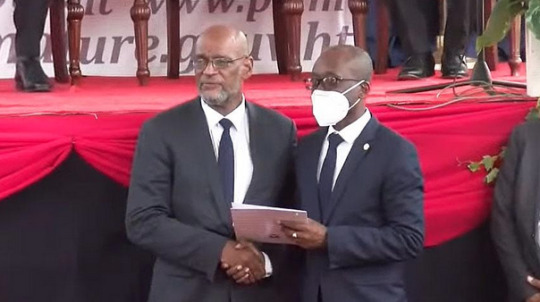
Some of these people did what they could to impair efforts of DGPNH Elbie to acquire munitions, and equipment, required to coordinate security.

PNH officers and ordinary citizens died, because of these actions. Haitian businesses suffered. Schools could not continue. Hospitals closed.
The Nation was/is dying!
Throughout this fiasco, the American government, with their puppets in the OAS/CARICOM made inane statements that only solidified a paralysis.
And then, the recent collapse of Prime Minister Henry’s situation offered a door to survival. In any normal world, the PM was toast and we could move forward. The United States Government should have made a specific, easily understood statement – to the effect – the PM Henry MUST RESIGN!!!!
We had been dealing with Madam Manigat for months and it was now time to finalize the situation, and have her lead Haiti out of this endless spiral toward death and disaster.
I believed that Manigat was ready and willing to take the lead, solidifying the legacy of her and my friend President Leslie Manigat.

I drafted a simple statement that would point the way. It is attached at the bottom of this note and it gave the International Community more than they expected. For example, it declared the commitment to hold elections in November 2024. This is possible if everyone focuses on the challenge. The suggested delay, until August 2025 is pointless. Somewhere, along the line, a few people could create a violent situation and delay the process.
We can have elections in 2024 just as efficiently as 2025 if the International Community supports us with the elements required.
We have the determination.
Even as Madame Manigat was poised to issue the statement, American Secretary of State Antony Blinken blinked. He, and others, obfuscated in the support or lack of support for PM Henry. CARICOM zoomed through the sky.
And so, yesterday , I travelled to meet with Madame Manigat, with nine members of our team. She graciously received us at her residence. Our journey took us through several gang leader’s territories, where our transit was supported by the gangs.
Strangely, many of the gangs are really willing to disband, if we could find a solution.
In any event, it was soon apparent that Manigat saw the confused, foggy, befuddled, misdirected, uninformed, ignorant and dangerous position of our supposed allies as to be a poor basis upon which to risk whatever legacy she might possess.
And so, Mirlande Manigat declined the opportunity to play Russian Roulette with her image.
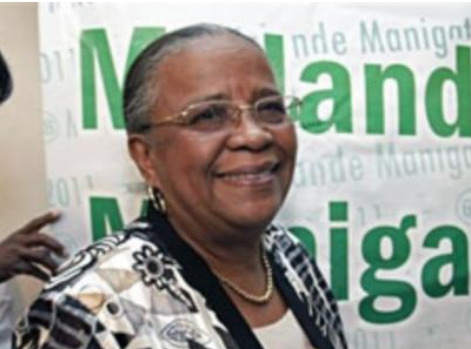
Our team traversed a major gang area, personally led by the father of the key gang leader – to guarantee our security.
That is Haiti on a personal level! Always has been.
I don’t know where we go from here. People look to me, for my input, because I have been exposed to Haiti for something over 44 years. My understanding of the situation, and the one hundred percent ability of the Americans, to make the wrong decision, when it comes to Haiti, leaves me without much optimism.
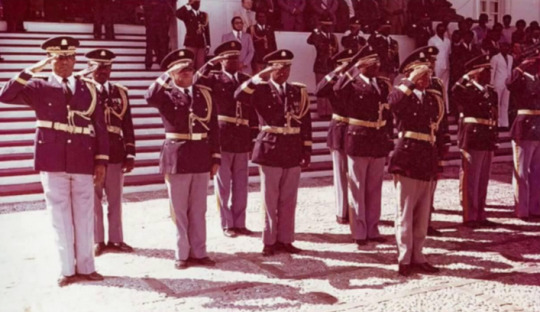
In 1994 I personally coordinated the American plan that saw Aristide’s return, predicated upon a reequipped and trained FadH to act as a countervailing force to Aristide’s predicted grab for dictatorial power.
The Americans expected elections to be held in December, 1994 and Aristide would be eliminated.
Aristide, the guy who got 67% of the monstrous 337,000 ballots cast in 1990 – out of a voted base of 3,500,000 – was returned, on the bayonets of 23,000 American soldiers in October, 1994.

November 18, 1994 Aristide disbanded the FadH, delayed elections and then cruised on to take dictatorial power, as predicted in the first place.
Then American propaganda created a terrible reputation, for the FadH and blocked any possibility of this Nation Saving Force to play a real part in our survival.
THERE MUST BE A LESSON HERE.
TODAY, THE NATION IS DYING. TOMORROW, IT’S PULSE WILL BE LESS. HOW LONG UNTIL THIS FLAT-LINES?
HERE IS THE DRAFT STATEMENT I PREPARED FOR MANIGAT’S CONSIDERATION:
I agreed to serve on the HCT, in the belief that Prime Minister Henry was honestly committed to initiating steps to bring Haiti out of the crisis that has effectively paralyzed the Nation since President Jovenel Moise’s assassination. Instead, we have been faced with delay, obfuscation and misdirection that leads nowhere.
We are wasting the valuable time of our 13, 000,000 citizens who deserve better.
Prime Minister Henry’s decision to bring foreign nations into Haiti appears, to many, a simple tool to guarantee his continued, ineffective, unconstitutional hold on power. The Kenyan police, and 2000 soldiers from Benin, would be an adequate force to maintain him in power forever..
The Prime Minister’s promise of elections, during August of 2025, is no promise at all. The Nation could invest time and money in preparing for the vote, only to be disrupted by a few, within the Prime Minister’s office, who could initiate some acts of violence, justifying delays on towards Infinity.
It is my belief that elections could be held during the fall of 2024, just as efficiently, or inefficiently, as those proposed for 2025. We should just declare a date, and work towards it.
We can do this.
I propose taking the authority given to me, but never exercised, to head a new government, creating a fresh cabinet whose members owe no specific loyalty to any political party or individual, as has been the past practice.
I would hope that all elements see the wisdom in this simple, straightforward approach to solving our challenging situation.
My solution will take major steps towards providing Haiti, and its citizens with the one building block required for any possibity to survive.
SEKIRITE.
Without SEKIRITE we can have nothing
Our society is disintegrating with each passing day as gangs challenge us throughout the countryside. The foreigners look for complex solutions when the formula for Haiti’s salvation is one the world can understnd… We must find a simple and direct solution to the Nation’s challenges;
ONLY ONE THING CAN SAVE Haiti – the gift of SEKIRITE
Haiti cannot have anything without SEKIRITE
There is no transporation without SEKIRITE
There is no school without SEKIRITE
There is no Investment without SEKIRITE
There are no tourists without SEKIRITE
There can be no health services without SEKIRITE
There can be no business without SEKIRITE
There can be no HOPE without SEKIRITE
All Haitians must join our journey along the troubled path toward our Nation’s future –the vehicle is SEKIRITE.
JOIN ME NOW!
SEKIRITE POUR TOUS!!
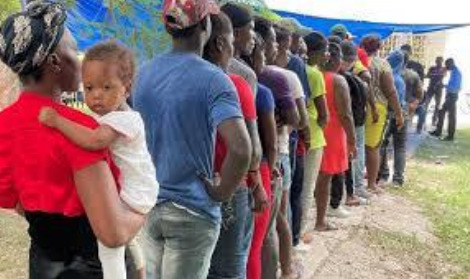
________________________________________________
COMMENT: HAITIAN TRUTH.ORG
We have accepted this article from Lynn Garrison, for publication, because of his long-term involvement with Haiti – at all levels. He first visited Haiti, in 1980, with Burt Lancaster, to capture Voodoo’s secrets for an American TV series.
From 1980 – 1991 he spent about one-third of his time in Haiti, generating a network of contacts.
When it looked like Diplomatic relations would be severed, in 1991, he was placed inside Grande Quartier Generale as the American embassy link with the Cedras team. Garrison remained there, from August 1991, through September 1994 when he escaped Aristide’s team and flew back to Florida.

Lynn Garrison returned to Haiti in 2004, with Aristide’s departure, and has functioned there since then.
He wrote VOODOO POLITICS- The Clinton/Gore Destruction of Haiti and ARISTIDE – The Death of a Nation. These covered his 1991 – 1994 experiences.
Garrison remains firmly committed to the fight for Haiti’s right to control its own affairs in today’s confused world.
5 notes
·
View notes
Text
//The Wire//2100Z March 18, 2024//
//ROUTINE//
//BLUF: PROTESTS BEGIN IN CUBA, VIOLENCE CONTINUES IN HAITI.//
-----BEGIN TEARLINE-----
-International Events-
Haiti: The situation on the ground remains tenuous as violence continues and the geopolitical situation remains challenging to describe. Many low-level gangs have taken advantage of the chaos in order to settle scores; many reports have surfaced of piles of bodies being found in the street, the reason for which is not often discernible. AC: Many people appear to be killed for any number of reasons, and perhaps most dangerously, for any reason at all. This unfortunately is not new for Haiti, and has been a tragic reality for those living in the beleaguered nation for years.
Cuba: Growing dissatisfaction among the populace has become more palpable following demonstrations throughout the country. Many of the demonstrations are in response to recent food shortages, which have increasingly become more serious over the years. A recent spike in blackouts and food shortages has resulted in localized demonstrations in many cities and towns throughout the nation.
Niger: The ruling military council has terminated the defense agreement that had previously allowed U.S. personnel to remain in the country. AC: As a reminder, Niger is technically in a state of military coup, following the ousting of President Bazoum in July, 2023.
-HomeFront-
Massachusetts: Six children have been criminally charged for speech crimes following the revelation of allegedly racist group chat messages. The District Attorney has charged all six juveniles with intent to commit a crime. Two of the children will be charged for interfering with civil rights, and another child will be charged with interfering with a witness. The charges come directly after the local NAACP branch sent a letter to the local school district, demanding an investigation.
-----END TEARLINE-----
Analyst Comments: In Niger, the ruling military council has mandated the immediate removal of all U.S. personnel from the territory of Niger. However, the timeline for such removal has not been clearly outlined. As it will take some time for the U.S. to draw down forces in the region, what comes next is not certain. Additionally, it is not clear as to if the U.S. will be leaving Niger. Immediately following the coup last year, similar demands were made as the military leadership sought to consolidate power. Currently, the U.S. military presence in Niger is largely focused at Base 201 (a secret drone base from which the U.S. conducted many operations against ISIS in the region), as well as at the U.S. Embassy, and the international airport in Naimey. At the time of the initial coup, it is likely that the American response was to “sit tight” and wait for an ECOWAS-led intervention force to restore order to the capital…a force that never came. Almost a year after tensions began, ECOWAS is not in a position to even guarantee their own internal security, much less launch an invasion into Niger. Consequently, it is possible that the U.S. will face the loss of yet another strategic military foothold in Africa, if an agreement with the ruling government of Niger cannot be established.
Analyst: S2A1
//END REPORT//
4 notes
·
View notes
Text
0 notes
Text
Haiti's top gang leader threatens politicians as fires break out in capital
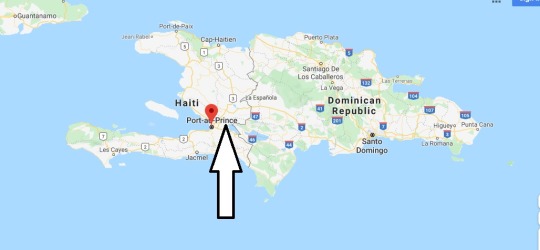
PORT-AU-PRINCE, March 14 (Reuters) - A powerful gang leader in Haiti has issued a threatening message aimed at political leaders who would participate in a planned transition council, as fires broke out amid a fresh surge of violence in the Caribbean nation's capital.
Nearby countries bolstered their border security and withdrew staff from embassies while plans to send a long-awaited international security force remain uncertain.
After unpopular Prime Minister Ariel Henry announced on Monday he would step down once the council was in place, the capital, Port-au-Prince, was initially quieter, but violence appeared to be flaring up again as of late Wednesday, with a shootout in one neighborhood and an attack on the police academy early on Thursday.
A fire broke out at the main penitentiary, emptied of prisoners by armed men earlier this month. Thick black smoke earlier billowed out from the facility, but the fire appeared to be out by Thursday afternoon, when local media showed heavily armed police entering the partially blackened site filled with mounds of trash.
Reuters could not immediately establish if any people had remained in the jail or what sparked the blaze.
A police union said the national police chief Frantz Elbe's house had also been set on fire on Thursday. It did not say whether anyone had been hurt or give details on Elbe's whereabouts.
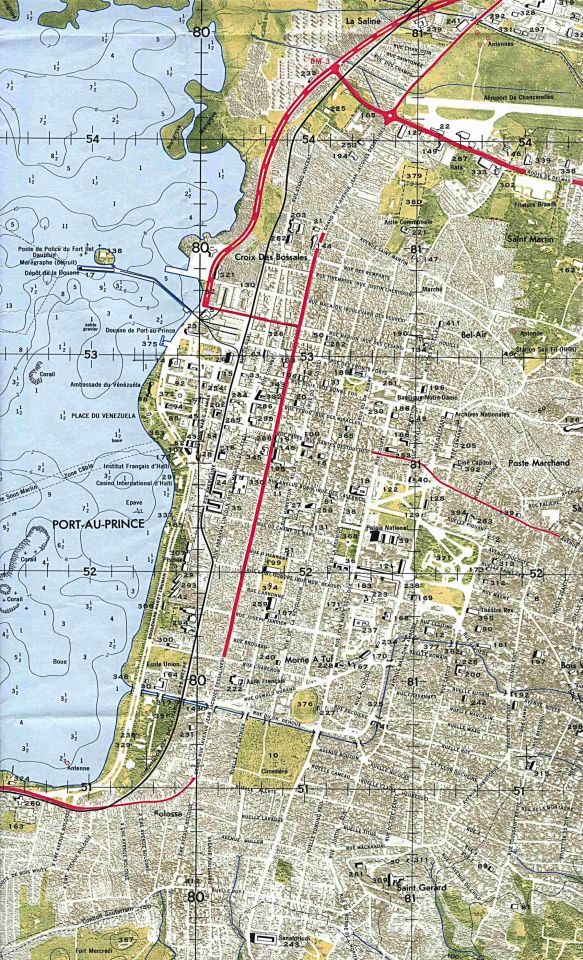
Haiti is struggling to resolve a long-running political and humanitarian crisis. Heavily armed gangs have taken over much of the capital, and rights groups have reported widespread killings, kidnappings and sexual violence. Hundreds of thousands of people have been displaced.
Henry, who was never elected, had been appointed prime minister by President Jovenel Moise in 2021, shortly before Moise was assassinated. Henry repeatedly postponed elections.
The comments from gang alliance head Jimmy "Barbeque" Cherizier were recorded on Wednesday and distributed via a rambling seven-minute audio message widely shared on Thursday morning on messaging platform WhatsApp.
"Don't you have any shame?" said Cherizier, directing his remarks at politicians who he said were looking to join the council. "You have taken the country where it is today. You have no idea what will happen," he added.
"I'll know if your kids are in Haiti, if your wives are in Haiti ... if your husbands are in Haiti," he said in an apparent threat to their families. "If you're gonna run the country all your family ought to be there."
In his remarks, Cherizier said the resignation of Henry was only "a first step in the battle" for the island nation of around 11 million.
Haiti's government again extended a nightly curfew through Sunday, in an order signed by acting Prime Minister Michel Boisvert. Henry has been stranded abroad since trying to return from a trip to Kenya to secure support for a security mission.
Regional bloc CARICOM has detailed the political parties and other social sectors set to make up the nine-member transition council that will take over from Henry. Negotiations over the council were brokered by Caribbean leaders and U.S. Secretary of State Antony Blinken, but formal appointments are yet to be made.
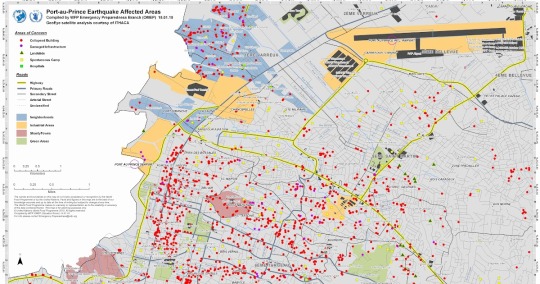
On Wednesday, the leader of a party declined an offer of a voting member of the council, backing instead an alternate three-member transition council that would empower former coup leader Guy Philippe, who was recently imprisoned in the United States and is seeking an amnesty for gang leaders.
EMBASSY REDUCTIONS
With Haiti's political future in limbo and the timing of the long-delayed Kenyan-led security mission unclear, the already sparse international presence in Haiti has been further receding.
Canada announced a reduction to its embassy staff that will leave only essential employees in the country, and said the embassy was temporarily closed to the public. That follows similar drawdowns by the United Nations and at the U.S. embassy.
The country's main cargo port said that despite military reinforcements, it would not receive vessels until further notice, as it assesses damages to containers and infrastructure.
Major passenger cruise line Royal Caribbean Group also suspended for a week its regular visits to Labadee, its private resort in northern Haiti.
Fearing a spread of instability in the region, Britain said it was bolstering security in the Turks and Caicos Islands, an overseas territory, as did the governor of the U.S. state of Florida. The Dominican Republic, which shares the island of Hispanolia with Haiti, closed its shared border with Haiti last year and has regularly deported Haitians.
The U.S. southeast coast guard said, "At this time, irregular migration flows through the Caribbean remain low."
Dominican media reported that aviation authorities in a press conference rejected a U.N. statement claiming that an airbridge would be set up from the country to bring humanitarian aid to Haiti, maintaining the airspace would remain closed.
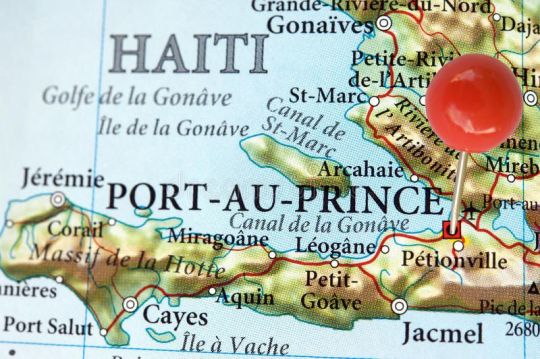
Aid group Mercy Corps said Port-au-Prince residents were being reduced to "forced nomads," seeking refuge from shootings in temporary shelters with family or strangers and battling constant uncertainty, food shortages, trauma, illness and overcrowding.
Marie Love Elucien, 25, who lost her home and shop due to gangs, told Mercy Corps that she was most afraid for her young daughter: "I'm worried she's going to have a fit and become paralyzed because every time she hears the shots she jumps and screams.
"She cries incessantly and no one can touch her; she becomes hysterical and uncontrollable," she said.
More than 360,000 people are internally displaced in Haiti, according to U.N. estimates.
Gina Antoine, a 43-year-old pregnant mother of three, told Mercy Corps that she was exhausted from moving between neighborhoods and could not run anymore.
"We face inhumane situations daily, walking among corpses. Gangs can attack at any moment," she said. "I have nowhere else to go. I wish everything could return to normal."
#Haiti#Haiti Revolution 2024#Haiti's top gang leader threatens politicians as fires break out in capital
3 notes
·
View notes
Text

LETTERS FROM AN AMERICAN
September 24, 2023
HEATHER COX RICHARDSON
The chairman of the Joint Chiefs of Staff is the nation’s highest-ranking military officer and the principal military advisor to the president, secretary of defense, and national security council. The current chairman, Army General Mark Milley, has served in the military for 44 years, deploying in Iraq, Afghanistan, Egypt, Panama, Haiti, Bosnia-Herzegovina, Colombia, Somalia, and the Republic of Korea. He holds a degree in political science from Princeton University, a master’s degree in international relations from Columbia University, and a master’s degree from the U.S. Naval War College in national security and strategic studies.
Former president Trump chose Milley for that position, but on Friday night, Trump posted an attack on Milley, calling him “a Woke train wreck” and accusing him of betraying the nation when, days before the 2020 election, he reassured his Chinese counterpart that the U.S. was not going to attack China in the last days of the Trump administration, as Chinese leaders feared.
Trump was reacting to a September 21 piece by Jeffrey Goldberg about Milley in The Atlantic, which portrays Milley as an important check on an erratic, uninformed, and dangerous president while also warning that “[i]n the American system, it is the voters, the courts, and Congress that are meant to serve as checks on a president’s behavior, not the generals.”
Trump posted that Milley “was actually dealing with China to give them a heads up on the thinking of the President of the United States. This was an act so egregious that, in times gone by, the punishment would have been DEATH! A war between China and the United States could have been the result of this treasonous act. To be continued!!!”
In fact, the calls were hardly rogue incidents. Secretary of Defense Mark Esper, another Trump appointee, endorsed Milley’s October call, and Secretary of Defense Christopher Miller, who replaced Esper when Trump fired him just after the election, gave permission for a similar call Milley made in January 2021. At least ten officials from the Central Intelligence Agency and the State Department were on the calls.
Trump is suggesting that in acting within his role and through proper channels, our highest ranking military officer has committed treason and that such treason in the past would have warranted death, with the inherent suggestion that we should return to such a standard. It seems much of the country has become accustomed to Trump’s outbursts, but this threat should not pass without notice, not least because Representative Paul Gosar (R-AZ) echoed it today in his taxpayer-funded newsletter.
In the letter, Gosar refers to Milley as “the homosexual-promoting-BLM-activist Chairman of the military joint chiefs,” a “deviant” who “was coordinating with Nancy Pelosi to hurt President Trump, and treasonously working behind Trump’s back. In a better society,” he wrote, “quislings like the strange sodomy-promoting General Milley would be hung. He had one boss: President Trump, and instead he was secretly meeting with Pelosi and coordinating with her to hurt Trump.”
Trump chose Milley to chair the Joint Chiefs but turned on him when Milley insisted the military was loyal to the Constitution rather than to any man. Milley had been dragged into participating in Trump’s march across Lafayette Square on June 1, 2020, to threaten Black Lives Matter protesters, although Milley peeled off when he recognized what was happening and later said he thought they were going to review National Guard troops.
The day after the debacle, Milley wrote a message to the joint force reminding every member that they swore an oath to the Constitution. “This document is founded on the essential principle that all men and women are born free and equal, and should be treated with respect and dignity. It also gives Americans the right to freedom of speech and peaceful assembly…. As members of the Joint Force—comprised of all races, colors, and creeds—you embody the ideals of our Constitution.”
“We all committed our lives to the idea that is America,” he wrote by hand on the memo. “We will stay true to that oath and the American people.”
Milley’s appearance with Trump as they crossed Lafayette Square drew widespread condemnation from former military leaders, and in the days afterward, Milley spoke to them personally, as well as to congressional leaders, to apologize. Milley also apologized publicly. “I should not have been there,” he said to graduates at National Defense University’s commencement. “My presence in that moment and in that environment created a perception of the military involved in domestic politics.” Milley went on to defend the Black Lives Matter protesters Trump was targeting, and to say that the military must address the systematic racism that has kept people of color from the top ranks.
Milley’s defense of the U.S. military, 43% of whom are people of color, drew not just Trump’s fury, but also that of the right wing. Then–Fox News Channel personality Tucker Carlson made a special effort to undermine the man he said was “not just a pig, he’s stupid!” “The Pentagon is now the Yale faculty lounge, but with cruise missiles. That should concern you,” he told his audience. As Carlson berated the military for being “woke,” his followers began to turn against the military they had previously championed.
Trump has made it clear he intends to weaponize the government against those he perceives to be his enemies, removing those who refuse to do his bidding and replacing them with loyalists. Ominously, according to Goldberg, another area over which Trump and Milley clashed was the military’s tradition of refusing to participate in acts that are clearly immoral or illegal. Trump overrode MIlley’s advice not to intervene in the cases of three men charged with war crimes, later telling his supporters, “I stuck up for three great warriors against the deep state.”
Goldberg points out that in a second Trump administration packed with loyalists, there will be few guardrails, and he notes that Milley has told friends that if Trump is reelected, “[h]e’ll start throwing people in jail, and I’d be on the top of the list.”
But Milley told Goldberg he does not expect Trump to be reelected. “I have confidence in the American people,” he said. “The United States of America is an extraordinarily resilient country, agile and flexible, and the inherent goodness of the American people is there.” Last week, he told ABC’s Martha Raddatz that he is “confident that the United States and the democracy in this country will prevail and the rule of law will prevail…. These institutions are built to be strong, resilient and to adapt to the times, and I'm 100% confident we'll be fine."
Milley’s statement reflects the increasingly powerful reassertion of democratic values over the past several years. In general, the country seems to be moving beyond former president Trump, who remains locked in his ancient grievances and simmering with fear about his legal troubles—Adam Rawnsley and Asawin Suebsaeng of Rolling Stone recently reported he has been asking confidants about what sort of prison might be in his future—and what he has to say seems so formulaic at this point that it usually doesn’t seem worth repeating. Indeed, much of his frantic posting seems calculated to attract headlines with shock value.
But, for all that, Trump is the current frontrunner for the Republican presidential nomination. He has suggested that the chairman of the Joint Chiefs of Staff, the nation’s senior military advisor, has committed treason and that such a crime is associated with execution, and one of his loyalists in government has echoed him.
And yet, in the face of this attack on one of our key national security institutions, an attack that other nations will certainly notice, Republican leaders remain silent.
—
LETTERS FROM AN AMERICAN
HEATHER COX RICHARDSON
#Letters From An American#Heather Cox Richardson#Mark Milley#TFG#history#January 6#the US Miliary#January 6 2021
8 notes
·
View notes
Text
Holidays 3.20
Holidays
Alien Abduction Day
American Diabetes Association Alert Day
Atheist Pride Day [also 6.20]
Bibliomania Day
Big Bird Day
Chicka Chicka Boom Boom Day
Culture Day and Creative Intelligentsia Day (Tajikistan)
Dibber Day (French Republic)
Dogs in Yellow Day
Durham Day (UK)
Extraterrestrial Abductions Day
Festival of Extraterrestrial Abductions
French Language Day (a.k.a. International Francophonie Day; UN)
Ghode Jatra (Horse Festival; Nepal)
Global Message Makes Me Happy & Healthy Day
Great British Spring Clean Day (UK)
Hufflepuff Pride Day
International Astrology Day
International Day of Happiness (UN)
International Francophonie Day
Kiss Your Fiancé Day
Lajos Kossuth Day (Hungary)
Legba Zaou (Haiti)
Li-Fraumeni Syndrome Awareness Day
Macaron Day NYC
Mesopotamian/Sumerian Grain Festival (Honoring Ashnan)
Minion Day (Japan)
Mister Rogers Day
National Arts Advocacy Day
National Backyard Bird Photography Day
National Cherry Blossom Festival begins (Washington DC)
National Day of Italian Universities Day (Italy)
National Native HIV/AIDS Awareness Day
National Jump Out! Day
National Marketing Day
National Plagiocephaly & Torticollis Awareness Day
National Vanessa Day
National Westie Day
Oil Nationalization Day (Iran)
Pigeons Return to City-County Building (Ft. Wayne, Indiana)
P320 Day
Smile Rejuvenation Day
Very Hungary Caterpillar Day
Won't You Be My Neighbor? Day
Won’t You Wear a Sweater Day
World Behavior Analysis Day
World Day of Theater for Children and Young People
World Frog Day
World Head Injury Awareness Day
World NIDCAP Day
World Oral Health Day
World Rewinding Day
World Rights to Water Day
World Sparrow Day
Zipper Day
Food & Drink Celebrations
Bock Beer Day (New York) [also 2nd Monday]
Crawfish Cravers Awareness Day
Macaron Day
National Ravioli Day
World Flour Day
3rd Wednesday in March
Engineer’s Day (Belgium; Netherlands) [3rd Wednesday]
Kick Butts Day [3rd Wednesday]
National Carry Out Day (a.k.a. Carry Out Wednesday) [3rd Wednesday]
National Dietician’s Day (Canada) [3rd Wednesday]
National SBDC Day [3rd Wednesday]
Small Business Development Day [3rd Wednesday]
Independence & Related Days
Blackland (a.k.a. Kingdom of Blackland; Declared; 2015) [unrecognized]
Conzorica (a.k.a. Federal Republics of Conzorica; Declared; 2014)
Kirkuk Liberation Day (Iraqi Kurdistan)
Otango Province Anniversary (New Zealand)
Qootärlænt (Declared; 2008) [unrecognized]
Rezaxia (Declared; 2020) [unrecognized]
Tunisia (from France, 1956)
New Year’s Days
Baha’i New Year
Nowruz (New Year) [Day 1, Around Spring Equinox] (a.k.a. ...
Bahá'í Naw-Rúz (Bahá'í)
Naruz (Afghan New Year)
Navruz (Tajikistan, Ukbekistan)
Norooz (Iran)
Novruz Bairam (a.k.a. Persian New Year; Azerbaijan)
Nowrūz (Persian, Gilaki, Kurdish, Zoroastrians; California)
Rosicrucian New Year
Festivals Beginning March 20, 2024
Jazz & Rhythms Festival (San Cristóbal de las Casas, Mexico) [thru 3.24]
Melbourne International Flower & Garden Show (Melbourne, Australia) [thru 3.24]
National Cherry Blossom Festival (Washington, DC) [thru 4.14]
Trans-Siberian Art Festival (Novosibirsk, Russia) [thru 4.7]
Feast Days
Alexandra (Christian; Saint)
Apple Magic Day (For Norse Goddess Idunn; Starza Pagan Book of Days)
Big Bird (Muppetism)
Blessed John of Parma (Christian; Saint)
Clement of Ireland (Christian; Saint)
Cuthbert of Lindisfarne (Christian; Saint) [maltsters]
Day Sacred to the Goddess Fortuna, the Morrigan, the Norns, the Three Fates, and the Three Mothers (Lakshmi, Parvati, and Sarasvati)
Edward Poynter (Artology)
Extraterrestrial Abductions Day (Pastafarian)
Feast of the Supreme Ritual (Thelema)
Festival For Driving Out All Evils (Inca)
Festival of Isis (Ancient Egypt)
George Caleb Bingham (Artology)
Henrik Ibsen (Writerism)
Herbert of Derwentwater (Christian; Saint)
John Lavery (Artology)
John of Nepomuk (Christian; Saint)
Józef Bilczewski (Christian; Saint)
María Josefa Sancho de Guerra (Christian; Saint)
Martin of Braga (Christian; Saint)
The Martyrs of Mar Saba (Christian; Martyrs)
Michele Carcano (Christian; Saint)
Philo of Alexandria (Positivist; Saint)
Photina and Her Companions (Christian; Martyrs)
Quinquatria, Day 2: Wrestling Day (Pagan)
Spring Harvest Festival (Ancient Egypt; Everyday Wicca)
Wulfram (Christian; Saint)
Xena Day (Church of the SubGenius; Saint)
Zagmuk (Festival celebrating the Resurrection of Marduk)
Lucky & Unlucky Days
Prime Number Day: 79 [22 of 72]
Shakku (赤口 Japan) [Bad luck all day, except at noon.]
Very Unlucky Day (Grafton’s Manual of 1565) [17 of 60]
Premieres
After Hours, by The Weekend (Album; 2020)
Armchair Apocrypha, by Andrew Bird (Album; 2007)
Avalanche is Better None or Snows You Old Man (Rocky & Bullwinkle Cartoon, S1, Ep. 33; 1960)
Back Off Boogaloo, recorded by Ringo Starr (Song; 1972)
Basic Instinct (Film; 1992)
Below Zero Heroes or I Only Have Ice for You (Rocky & Bullwinkle Cartoon, S1, Ep. 34; 1960)
The Book of Thoth (Egyptian Tarot), by Aleister Crowley (Tarot Book; 1944)
Bosko’s Easter Eggs (Happy Harmonies Cartoon; 1937)
Both Sides Now, by Joni Mitchell (Album; 2000)
Cannibal Capers (Disney Silly Symphony Cartoon; 1930)
The Cats Bah (WB LT Cartoon; 1954)
Dumb-Hounded (Droopy MGM Cartoon; 1943)
Duplicity (Film; 2009)
Fractured Friendship (Chilly Willy & Woody Woodpecker Cartoon; 1965)
Hollywood Shuffle (Film; 1987)
Hothouse, by Brian W. Aldiss (Novel; 1962)
I Do Not Want What I Haven’t Got, by Sinead O’Connor (Album; 1990)
I Love You, Man (Film; 2009)
The Impossible Possum, featuring Barney Bear (MGM Cartoon; 1954)
Insurgent (Film; 2015)
Knowing (Film; 2009)
Lady Chatterly’s Lover, by D.H. Lawrence (Novel; 1928)
Man of La Mancha (Broadway Musical; 1965)
Meet the Temptations, by The Temptations (Album; 1964)
Neptune Nonsense (Rainbow Parade Cartoon; 1936)
Newman Laugh-O-Grams (Disney Cartoon; 1921)
Noises Off (Film; 1992)
Off to China (Terrytoons Cartoon; 1936)
The Pink Panther (Film; 1964)
The Postman Always Rings Twice (Film; 1981)
The Romance of Betty Boop (Animated TV Film; 1985)
The Scarlet Letter, by Nathaniel Hawthorne (Novel; 1850)
Sham Battle Shenanigans (Terrytoons Cartoon; 1942)
Straight, No Chaser, by Thelonious Monk (Album; 1967)
Symphony Hour (Disney Cartoon; 1942)
Top Cat and the Beverly Hills Cats (Hanna-Barbera Animated TV Film; 1988)
Uncle Tom’s Cabin, by Harriet Beecher Stowe (Novel; 1857)
Wacky Quacky (Phantasies Cartoon; 1947)
What Price Fleadom (MGM Cartoon; 1948)
Wild Things (Film; 1998)
Ye Olde Songs, featuring Farmer Al Falfa (Terrytoons Cartoon; 1932)
Zen in the Art of Archery, by Eugen Herrigel (Philosophy Book; 1948)
Zombeavers (Film; 2015)
Today’s Name Days
Claudia, Wolfram (Austria)
Ivan, Nicet, Pavao (Croatia)
Světlana (Czech Republic)
Gordius (Denmark)
Malve, Malvi, Malviine (Estonia)
Aki, Jaakkima, Joakim, Jooa, Kim, Kimi (Finland)
Herbert, Printemps (France)
Claudia, Wolfram (Germany)
Claudia, Rodi, Rodianos (Greece)
Klaudia (Hungary)
Alessandra,, Claudia (Italy)
Irbe, Made, Magda, Magdalēna (Latvia)
Filomenas, Imgarda, Irma, Tautvilė, Žygimantas (Lithuania)
Joakim, Kim (Norway)
Aleksander, Aleksandra, Ambroży, Anatol, Bogusław, Cyriaka, Eufemia, Klaudia, Patrycjusz, Ruprecht, Wasyl, Wincenty (Poland)
Víťazoslav (Slovakia)
Alejandra, Daniel, Martín (Spain)
Joakim, Kim (Sweden)
Dillan, Dillion, Dillon, Drew, Dru, Dylan, Dylon (USA)
Today is Also…
Day of Year: Day 80 of 2024; 286 days remaining in the year
ISO: Day 3 of week 12 of 2024
Celtic Tree Calendar: Fearn (Alder) [Day 4 of 28]
Chinese: Month 2 (Ding-Mao), Day 11 (Guy-Wei)
Chinese Year of the: Dragon 4722 (until January 29, 2025)
Hebrew: 10 Adair II 5784
Islamic: 10 Ramadan 1445
J Cal: 20 Green; Sixday [20 of 30]
Julian: 7 March 2024
Moon: 82%: Waxing Gibbous
Positivist: 24 Aristotle (3rd Month) [John the Evangelist]
Runic Half Month: Beore (Birch Tree) [Day 11 of 15]
Season: Spring (Day 2 of 92)
Week: 3rd Week of March
Zodiac: Pisces (Day 31 of 31)
2 notes
·
View notes
Text
In May 1954, less than a decade after the founding of the United Nations, then-Secretary-General Dag Hammarskjold concluded an address to the University of California, Berkeley by asserting that the organization “was not created in order to bring us to heaven but in order to save us from hell.” His words now seem a clear-eyed description of both the world body’s raison d’être and its limitations: The U.N. cannot necessarily prevent wars, but it may be able to disincentivize their worst excesses.
The collegiate audience would have understood “hell” as referring to the horrors of World War II. Hammarskjold also spoke just one year after the end of the Korean War, the first conflict in which the U.N. took a side, supporting South Korea. The Korean armistice created the Demilitarized Zone, freeing those south of the line from the invading communists but trapping those north under a despotic regime. The decision was seen as preferable to allowing the entire Korean Peninsula to fall.
Today, the Security Council, the U.N. organ with primary responsibility for maintaining international peace and security, finds itself at an impasse. Council members are often unable to agree on when to make demands of member states, and when the council does make demands, they are seldom implemented. This institutional paralysis harms U.N. credibility and affects the conflicts currently dominating headlines—in Gaza and Ukraine—and those raging just offscreen, such as in Haiti and Sudan.
Some world powers, chief among them Russia, are using the deadlock on the Security Council to deflect from their own actions—distractions that can quickly reverberate around the world. Both Israel and the Palestinians have recently used the platform to hone their messaging on the war in Gaza. Palestine’s permanent observer to the U.N. has accused Israel of exaggerating some details of Hamas’s Oct. 7 attack, when militants killed around 1,200 people in southern Israel and abducted 253 others. Israel has invited diplomats, politicians, and journalists (including this reporter) to view footage from the attack.
Nearly six months into the war, the Hamas-run Gaza Health Ministry estimates that some 32,000 Palestinians have been killed, many of them women and children, and many more have been seriously injured. Israel says at least 134 hostages remain in Gaza, and some are presumed dead. On March 25, after months of back and forth, the Security Council adopted a resolution, drafted by the 10 elected members of the body, demanding an immediate cease-fire in Gaza and the unconditional release of all hostages.
The United States abstained, allowing the resolution to go through—days after Russia and China vetoed a U.S.-drafted resolution also calling for a cease-fire. (A Security Council resolution requires nine votes in favor, with no vetoes from the five permanent members.) The United States used its own veto to stop three previous Gaza cease-fire resolutions. In those cases, it cited Israel’s right to self-defense, ongoing negotiations in the Middle East, or the council’s failure to condemn the Oct. 7 attack by Hamas, which Washington and other capitals consider a terrorist organization.
The competing Gaza resolutions show how, in the 70 years since Hammarskjold’s speech, the body politic that makes up the U.N. has grown further apart. This polarization disturbs the heading of the organization’s moral compass. Increasingly, the needle swings according to the interest of the dominant faction during a given crisis, which has proved useful to parties seeking to reframe public perceptions—and to nudge this needle in the direction of their choosing.
In the clash of wills over Gaza on the Security Council, Russia’s U.N. ambassador, Vassily Nebenzia, accused the 11 council members that voted for the recent U.S.-drafted resolution of “cover[ing] themselves in disgrace.” He then stated, without irony, that Russia understood its role as a founding member of the U.N. and recognized the “historical global responsibility we shoulder for the maintenance of international peace and security.” When both Russia and China vetoed the U.S. draft, it was a bit of déjà vu: Last October, the two powers vetoed a humanitarian-focused resolution on Gaza submitted by the United States.
Of course, the latest round of Security Council ping-pong has played out while Russia has a particular incentive to distract from its ongoing war in Ukraine. For her part, U.S. Ambassador to the U.N. Linda Thomas-Greenfield said Russia and China vetoed the U.S.-drafted resolution for two cynical reasons: first, she speculated, because they could not bring themselves to “condemn Hamas’s terrorist attacks on Oct. 7,” and second, because Russia and China simply didn’t want to vote for a draft written by the United States, because they “would rather see us fail than to see this council succeed.”
Meanwhile, Israel has continued its own lobbying. As months dragged on without the Security Council condemning the Oct. 7 attack, Israel’s U.N. envoy began calling on the U.N. secretary-general to resign and addressing Security Council meetings wearing a yellow Star of David. Two weeks before the council considered the latest cease-fire resolutions, Israel’s foreign minister came to New York—accompanied by family members of hostages—to speak to a Security Council meeting about a U.N. report detailing sexual violence on Oct. 7 and to demand that the council designate Hamas as a terrorist organization and impose sanctions.
Israel’s messaging has made some impact. Some countries have paused their financial support for UNRWA, the U.N. aid agency for Palestinian refugees, over Israeli accusations that it employs Hamas members, including some involved in the Oct. 7 attack. The U.N. created a working group chaired by Catherine Colonna, who was until recently France’s foreign minister, to restore confidence in the agency; she is due to release a report in April with recommendations on how to strengthen its neutrality.
Until recently, the fiercest tug of war on the Security Council was over Russia’s full-scale invasion of Ukraine. Kyiv has now shifted its diplomatic strategy away from the U.N., two years after Moscow’s veto power blocked the Security Council from condemning the invasion. In February 2022 and 2023, the 193-member General Assembly twice voted overwhelmingly to demand Russia’s withdrawal from Ukraine—votes that are nonbinding but are widely seen as reflecting global opinion. However, by the time of the second anniversary of the invasion, the mood had darkened.
The General Assembly did not hold another symbolic vote, but if it had, diplomats say some Middle Eastern countries that once supported Ukraine may have abstained because Kyiv abstained on resolutions calling for a cease-fire in Gaza.
When Ukrainian Foreign Minister Dmytro Kuleba emerged from the session marking the second anniversary in February, asked what he expected from the U.N. General Assembly, he told reporters, “My main audience today was our fellow colleagues from Asia, from Africa, from Latin America.” His priority was to explain Ukraine’s peace formula and the peace summit the country was planning with Switzerland, he said: “We want them to understand this initiative. We want them to understand that Ukraine wants peace more than anyone else.”
Kuleba’s answer was telling. He has clearly grasped the need to shore up Ukraine’s support in the global south, where Russia has made headway, and Kyiv is venturing further afield of the Security Council. At the NATO summit in Vilnius, Lithuania, last year, G-7 leaders declared their intention to work on a series of bilateral security arrangements with Ukraine. Today, more than 30 countries are in bilateral negotiations to help shore up Ukraine’s defenses.
And when it comes to pursuing peace, the center of gravity has also shifted away from the U.N. headquarters in New York—to Switzerland for Ukrainians and to Qatar or Egypt for Palestinians. “I think that everyone quietly understands that the political deals necessary to end the Hamas-Israel war and the Russia-Ukraine war will not come out of the U.N.,” said Richard Gowan, the International Crisis Group’s U.N. director. “Instead, the U.N. is a platform for governments to vent and cast symbolic votes. It’s a venue for public messaging in these cases, not real diplomacy.”
Russian Foreign Minister Sergey Lavrov turned up in New York for a series of meetings on Gaza in January, a week after the World Economic Forum in Davos, Switzerland—where Russian officials and oligarchs have not been welcome for two years. An old hand at the U.N., Lavrov swept through the U.N. headquarters as if it were his own Davos. He convened a side meeting of envoys of the Organization of Islamic Cooperation and held bilateral meetings with the Palestinian permanent observer to the U.N. and with foreign ministers from a swath of Middle Eastern countries, including NATO member Turkey, current Security Council member Algeria, and Iran, which financially backs Hamas.
At the time, Russia’s hard-fought battle to capture Avdiivka, a city in eastern Ukraine, was reaching its climax—and Moscow was arguing vociferously in the Security Council for a cease-fire in Gaza. This strategy has distracted from some of Russia’s other actions, including making North Korea a key supplier for ammunition, artillery, and missiles in violation of Security Council resolutions. Last week, Russia used its veto power to shield North Korea from a long-running U.N. monitoring program to enforce these sanctions after April. (China abstained, and the 13 other council members voted in favor.)
In February, South Korea and Japan, two current Security Council members, both expressed concern that Russian weapons transfers could end up aiding North Korea’s ballistic missile or nuclear weapons program—another global security threat.
There are benefits to dialogue between adversaries at the U.N. The closed-door meetings of the Security Council, where resolutions are hashed out in advance of a public meeting, provide rare opportunities for U.S. and Russian diplomats to interact. “I heard Americans saying that they appreciate talking to Russians at the closed meetings, even if they fight, but that’s the only place where they can actually interact with the Russians,” a diplomat recently said, speaking anonymously under diplomatic rules.
But when the Security Council approves resolutions, there can be little to show for it on the ground. Last October, the council authorized a peacekeeping force manned by Kenyan security personnel to grapple with the breakdown in public order in Haiti, but the deployment has been delayed amid spiraling violence. In Mali, where Russia’s Wagner Group forces have sealed a protection deal with the country’s military leaders, the junta forced out U.N. peacekeepers in December. The Security Council recently called for a Ramadan cease-fire in Sudan; three weeks into the Muslim holy month, the guns have not been silenced.
The Black Sea Grain Initiative that followed Russia’s full-scale invasion of Ukraine was one of the bright spots of U.N. diplomacy—until it wasn’t. The U.N. and Turkey brokered a deal to permit Russian and Ukrainian food and fertilizer shipments through the Black Sea. When the Kremlin withdrew from the arrangement last summer, the U.N. warned that the end of this deal might result in sharply higher global food prices and even famine in vulnerable countries.
In the end, the worst didn’t come to pass, in large part because Ukraine called Russia’s bluff that it would sink commercial vessels and kept the sea lanes open by sinking Russian military vessels in a series of sea drone and missile strikes. It wasn’t the United Nations’ moral compass that averted catastrophe—it was warfare.
Some analysts have unfavorably compared today’s U.N. to its predecessor, the League of Nations, which failed to prevent World War II. Others have suggested that it should be condemned to the dustbin of history. Things have changed since Hammarskjold’s 1954 speech. The Security Council’s commitment to support South Korea would not happen today; at the time, the Soviet Union was boycotting the council, and China was represented at the U.N. not by the Chinese Communist Party, which had just seized power, but by the Republic of China, the government that had fled to Taiwan.
But the challenges that the U.N. faces now are not new. The most significant change to the body in the last eight decades was the composition of the Security Council, and there have long been calls for reform to better reflect today’s world. The council expanded from 11 to 15 members in 1965, but there is no consensus on how to fairly add more. And more to the point, increasing the number of council members with veto power might enhance equity while further impairing the body’s effectiveness. Focusing on reforming procedures, including the veto power, may be more productive.
None of this accounts for the fact that the U.N. has become more polarized over the last decade because the world has too—both between countries and within them. But in the end, it would be a mistake to write off the U.N., which still ultimately aims toward Hammarskjold’s vision. The international community must hope against hope that these good intentions push the needle back in the right direction.
19 notes
·
View notes
Text
SAN SALVADOR (Reuters) - El Salvador's state of emergency to combat gangs, which has widespread public support despite a growing prison population and allegations of human rights abuses, will be maintained until all criminals are captured, the country's security minister told Reuters.
Since President Nayib Bukele asked the country's congress to approve a state of exception in March last year, security forces have arrested more than 64,000 suspected gang members and associates. Authorities estimate they have around 10,000 more arrests to make and the measure has been regularly extended.
"As long as we have these murderers and these terrorists fleeing and escaping within the country, this measure must continue," Security Minister Gustavo Villatoro said in an interview last week in his office in San Salvador.
He said Salvadoran authorities were working with counterparts in southern Mexico, Guatemala and the United States to find an unspecified number of gang members who had fled.
The crackdown on El Salvador's notorious gangs has more than halved murders in one of the most crime-ridden countries in the Western hemisphere, drawing the interest of other nations struggling with gang violence and raising questions about what rights citizens are willing to exchange for living on safer streets.
With nearly 2% of its adult population behind bars, El Salvador has the highest incarceration rate in the world and recently inaugurated one of the region's largest prisons, with a capacity for 40,000 inmates.
Under the state of emergency some constitutional rights have been suspended. Arrests can be made without a warrant, the government has unfettered access to private communications, and detainees' rights to a lawyer have been shelved.
But the vast majority of people in El Salvador say they approve of the hard-line approach and feel safer. A survey this month by pollsters CID Gallup found that 92% of the population supports the state of exception.
In 2022 homicides fell 57% to 495, from 1,147 in 2021, according to government figures. Extortion, one of the gangs' primary sources of income, has plummeted, many residents say. By August of last year, the transportation minister estimated bus companies had already saved around $50 million from not paying.
In Santa Tecla, a city just outside capital San Salvador, 45-year-old mechanic Manuel said he had paid extortion money for 12 years. Every two weeks he gave the money to hitmen from MS-13 who threatened to kill his wife and four children if he did not pay, and he was often forced to fix the gang's cars for free. During Christmas he would pay double.
But since last July, no one has come to collect the payment, he said.
"I feel calmer, I can go for a walk. I go out to walk every night with my young children," he told Reuters. "Before I didn't even take them out."
STRONGMAN MOVES
The results of the crackdown have led other countries in the region to consider similar policies, including Honduras, which implemented a pared-down version last December. El Salvador has also discussed offering support to Haiti, which has pleaded for help from the international community to end gang violence that has left much of its territory off-limits to the government.
Villatoro said El Salvador's curbed rights were necessary to ensure security and would only be lifted when the security risk "reaches numbers close to zero."
"The majority of Salvadorans have not been subjected to this suppression of rights," he said.
But the widening of state authority in the name of security, for some analysts, is in-step with other strongman moves Bukele has made to centralize power. He has dissolved anti-corruption legal bodies, stacked the country's top court with loyalists who immediately allowed for presidential re-election, and passed a sweeping law aimed at prohibiting journalists from writing about gangs.
Bukele has also built a communications juggernaut powered partly by paid internet trolls to hail his policies, especially on security, and attack those who raise human rights concerns.
Rights groups have documented hundreds of arbitrary arrests, torture, and the deaths of prisoners in state custody.
Human Rights Watch, citing leaked government data, has reported "mass due process violations" and said minors as young as 12 were being held in overcrowded prisons.
The government denies the accusations of torture and other rights abuses outside those allowed under the state of exception. Around 3,700 people who were considered to have been "coerced" by gangs into crimes had been released, Villatoro said.
"It doesn't interest us to convict anyone unjustly," he said.
For ten residents Reuters spoke to in neighborhoods around San Salvador once dominated by gangs the crackdown has transformed their lives for the better. They now can go outside at night, spend time at parks and soccer pitches, receive visitors from other parts of the city and even order fast food delivery - all unthinkable when the gangs roamed.
Alexander Guillen is a 24-year-old university student who is part of an artistic graffiti collective that now paints the walls where Barrio 18 tags once reigned.
"There is freedom that young people have to be able to perform, be it artistically, culturally, or in sports," he said. "We have that freedom to be able to develop ourselves... to be able to use the public spaces in the neighborhood without any fear."
7 notes
·
View notes